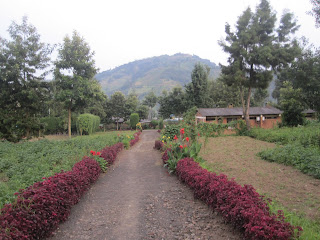Today marked ISAE’s 5th-ever graduation ceremony. 800-something students graduated with either an advanced diploma or bachelor’s degree in the faculties of Agriculture and Rural Development, Agricultural Engineering and Environmental Sciences, and Veterinary Medicine. It turns out I arrived at the perfect time because I got to take part in the ceremony with the teaching faculty, donning a green cap and gown with blue trim to denote my Bachelor’s degree. It brought back memories of my own graduation, not that long ago. In the morning, the faculty gathered and then the procession began. There’s a dirt road that connects the administrative building, the academic buildings, student dorms, and staff housing. It’s a public road where you see a lot of foot traffic by local people most of the time. Walking in lines down that road behind a marching band that came from Kigali for the occasion felt like being in a parade. Towards the end of the procession, as we entered the stadium, I gathered that we were supposed to march in step with the band and I was totally having a marching band flashback. (Except that it was a little harder to march downhill, over rocks, in heels.) This was obviously an exciting event for the community. Many people were lining the roads and children were running alongside the band. While slowly proceeding I had a lot of time to let my mind wander; wearing a cap and gown, marching behind a marching band, looking up at the beautiful rolling hills, and watching people from a different walk of life line the road, I had a moment where I was like, “how did I get here??” It was a little surreal.

The main administrative building at ISAE, with some graduates in the foreground
The ceremony itself was nice. Pretty much what one would expect at a graduation ceremony – similar to a graduation ceremony back home (speeches, calling of names, etc.). One different thing was the incorporation of traditional Rwandan dances. Entertainment breaks are great for keeping spirits up at such long ceremonies – I think American universities should consider it. At this modern graduation ceremony, I was thinking about how here and in many other places the traditional intertwines with the modern so naturally. This goes for clothing as well. You can easily see a person in traditional dress next to someone in “modern” clothing and it’s perfectly natural. This was absolutely true in Oman, as well. I love how people can move with the times while maintaining tradition and culture at the same time.
Me and my next-door neighbor
Finally, this event was a good way for me to meet a lot of people. I feel like it came just at the right time, as I have been here for about a week. Today I was introduced to a lot of great people – particularly some of the younger teachers in their 20s – who I can tell I’ll have a good time getting to know. For all of these reasons, it was a good day!



